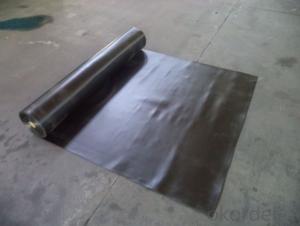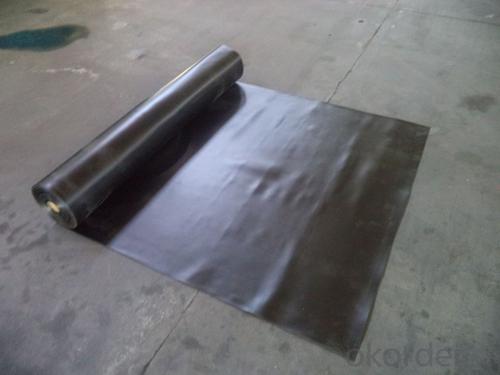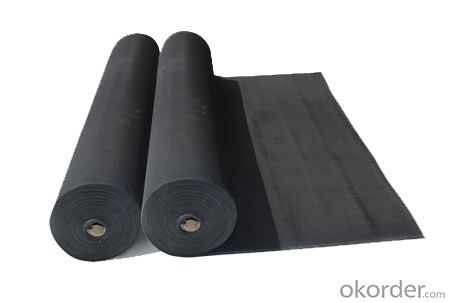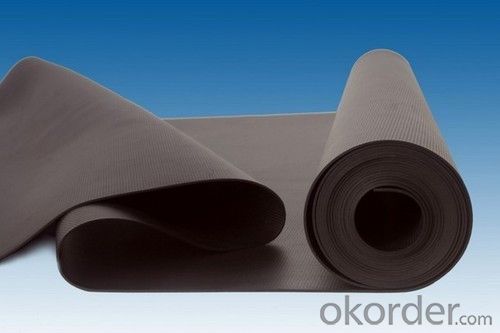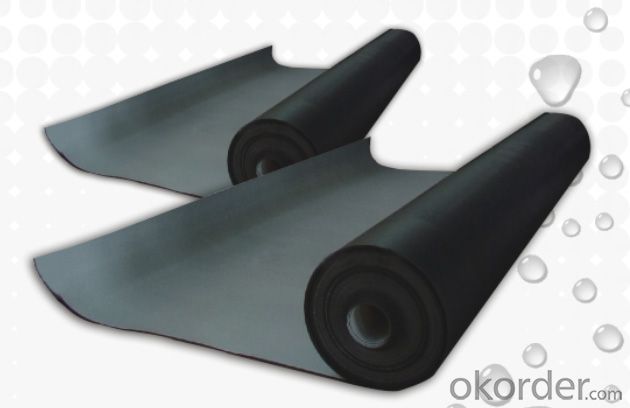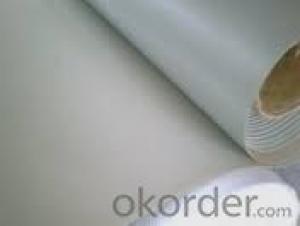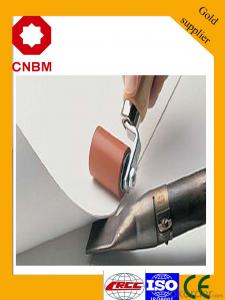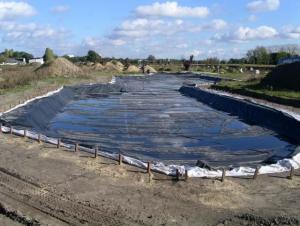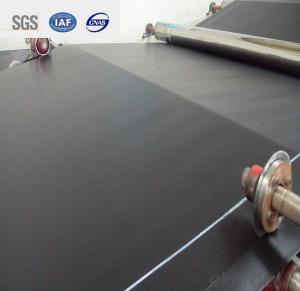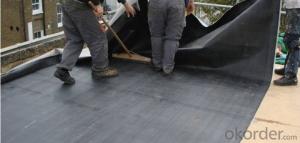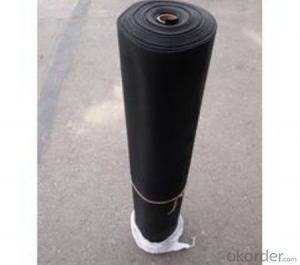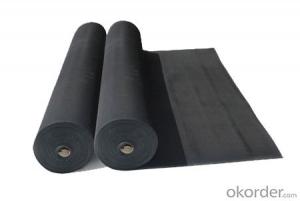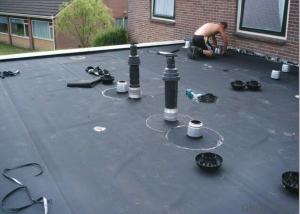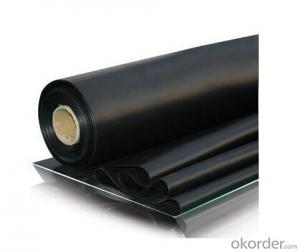EPDM Waterproof Vulcanized Membrane with 2.0mm Thickness
- Loading Port:
- Shanghai
- Payment Terms:
- TT or LC
- Min Order Qty:
- 20000 m²
- Supply Capability:
- 5000000 m²/month
OKorder Service Pledge
OKorder Financial Service
You Might Also Like
EPDM Waterproof Vulcanized Membrane with 2.0mm Thickness
Description Of EPDM Waterproof Vulcanized Membrane with 2.0mm Thickness:
1. EPDM waterproof membrane is made from ternary ethylene-propylene rubber, which is for waterproofing of exposed and non-exposed applications.
2. EPDM waterproof membrane production adopts the world-advanced equipment of cold feeding extrusion and continuous vulcanization technology.
3. EPDM waterproof membrane is of high elasticity among high polymer waterproof materials and becomes a world-popular waterproofing material.
Main Features of EPDM Waterproof Vulcanized Membrane with 2.0mm Thickness:
1.Excellent anti-aging performance, service life can reach 50 years;
2.High elongation, high tensile strength, heat treatment size change small;
3.Plant root penetration resistance is good
4.Good low temperature flexibility
5.Application is convenient, overlapping is firm and reliable, no environmental pollution;
6. Resistance to chemical corrosion, can be applied to special places;
7.Maintenance is convenient, the cost is low
Specifications of EPDM Waterproof Vulcanized Membrane with 2.0mm Thickness:
ITEM | STANDARO REQUEST | |
Tensile strength at breaking,normal temperature,Mpa | ≥7.5 | |
Elongation at breaking, % | ≥450 | |
Tearing strenght,KN/m | ≥25 | |
Bending at low temperature | ≤-40°C | |
Water impermeability,0.1Mpa×30min | Impermeability | |
Hot air aging 80°C×168h | Unchanging of tensile strength at breaking,% | ≥80 |
Unchanging of elongation at breaking,% | ≥70 | |
Appearance of 100% elongation | No crack | |
Property of anti alkali 10% Ca(OH)2×168h normal temperature | ≥80 | |
≥80 | ||
Applications of EPDM Waterproof Vulcanized Membrane with 2.0mm Thickness:
1.Roofs, Basement, Toilets
2. Industrial and civil building waterproofing
3. Geosynthetic liner for swimming pool, channels, irrigation system
4. Especially suitable for projects with high requirements in durability, anti-corrosion and deformation.
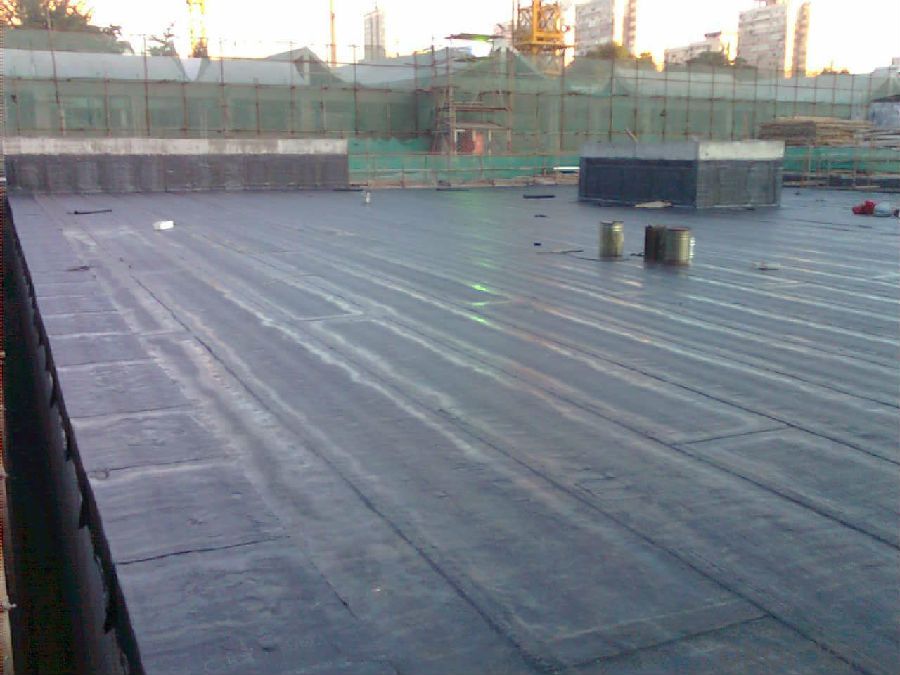
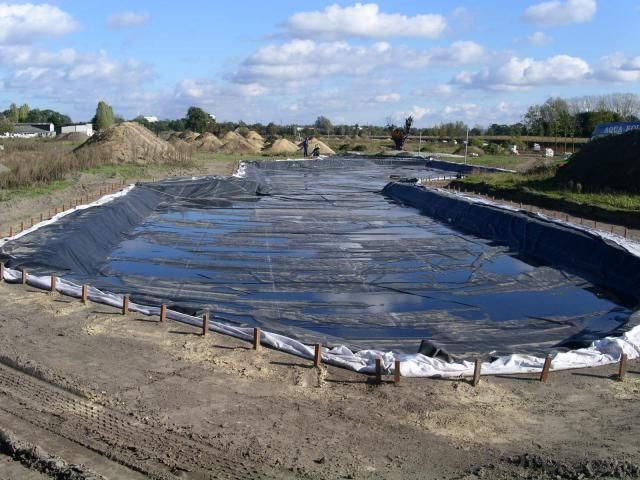
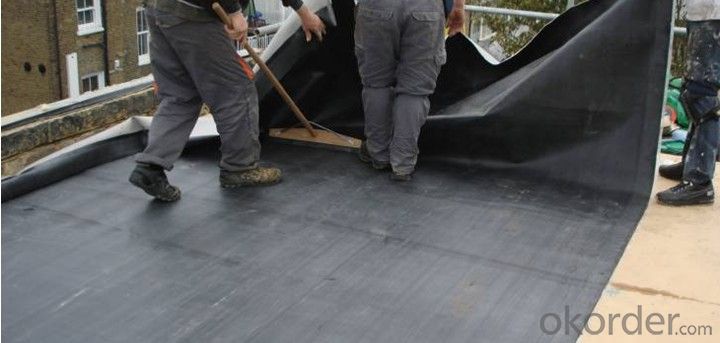
IMages of EPDM Waterproof Vulcanized Membrane with 2.0mm Thickness:
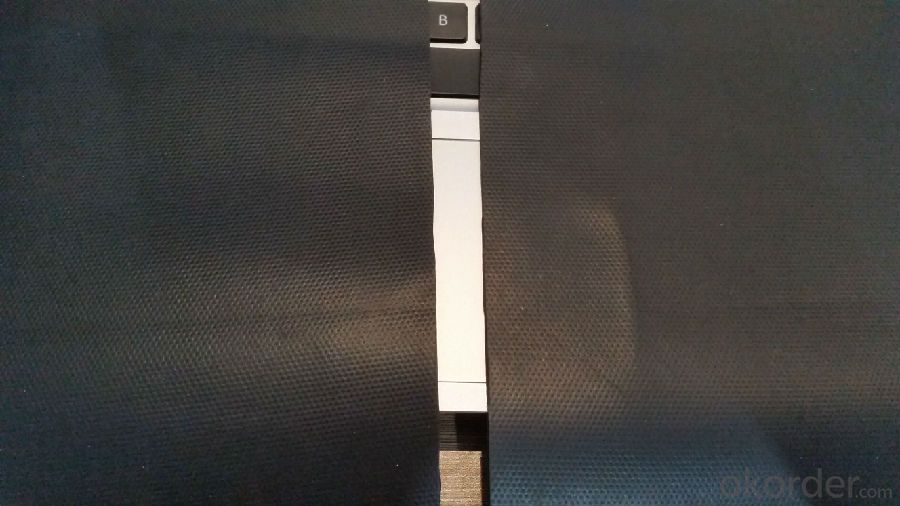
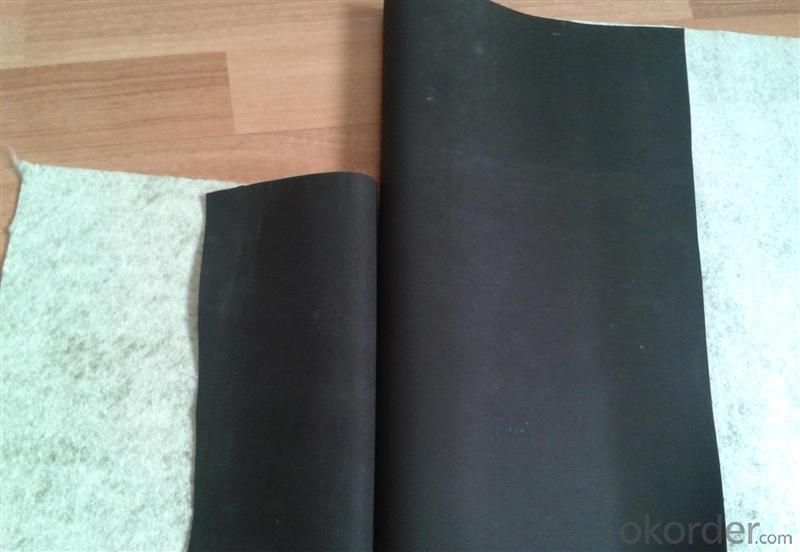
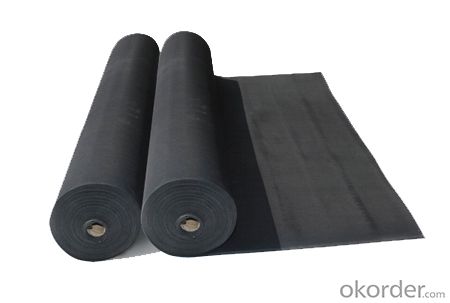
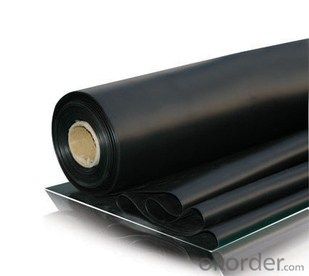
FAQ of EPDM EPDM Waterproof Vulcanized Membrane with 2.0mm Thickness:
1. What are we supplying?
We are specialized in producing Colorful Asphalt Roof Shingle, SBS/APP modified bitumen waterproof membrane, Self adhesive bitumen waterproof membrane, PVC waterproofing membrane, EPDM rubber roofing membrane, Single Component Polyurethane Waterproof Coating, and Spray Polyurea Waterproof Coating
.
2. How Many years experience do we have?
We have been exported to more than 20 countries in the past 15 years.
3. How long do we usually reply your request?
We always reply our customer within 24 hours.
- Q: Can a waterproofing membrane be used on glass surfaces?
- No, a waterproofing membrane cannot be used on glass surfaces. Waterproofing membranes are typically designed to adhere to porous and rough surfaces such as concrete, wood, or metal. Glass surfaces are smooth and non-porous, which makes it difficult for a membrane to adhere properly and provide a waterproof barrier. Additionally, glass is already naturally waterproof, so there is generally no need for additional waterproofing measures on glass surfaces.
- Q: Are waterproofing membranes resistant to fire?
- Waterproofing membranes possess the ability to resist fire. To guarantee the structure's safety, numerous waterproofing membranes are engineered with fire-resistant properties. These membranes typically consist of materials with exceptional fire ratings, effectively preventing the spread of flames. They are commonly employed in locations where fire safety is a priority, such as commercial buildings, high-rise structures, and industrial facilities. Furthermore, relevant authorities often subject these membranes to rigorous testing and certification to ascertain their fire resistance capabilities. Nevertheless, it is imperative to recognize that not all waterproofing membranes offer fire resistance. Hence, it is crucial to carefully select the appropriate membrane based on the specific fire safety requirements of the project.
- Q: How thick should a waterproofing membrane be applied?
- A waterproofing membrane should typically be applied to a thickness of at least 1.5mm to ensure effective protection against water infiltration.
- Q: Are waterproofing membranes suitable for tunnels?
- Yes, waterproofing membranes are suitable for tunnels. Tunnels are often subjected to high water pressure from the surrounding soil and groundwater, making them vulnerable to water ingress. Waterproofing membranes are designed to provide a protective barrier against water infiltration and can effectively prevent water from entering the tunnel structure. These membranes are typically made of durable materials such as bitumen, PVC, or EPDM rubber, which are resistant to water penetration. They are applied to the tunnel walls and ceiling to create a continuous, impermeable layer that keeps the tunnel dry. The membranes are also flexible, allowing them to accommodate any movement or settlement of the tunnel without compromising their waterproofing integrity. In addition to preventing water infiltration, waterproofing membranes also offer other benefits for tunnels. They can protect the tunnel structure from corrosion caused by water and chemicals, prolonging its lifespan. They can also help to improve the indoor air quality within the tunnel by preventing the growth of mold and mildew, which thrive in damp environments. Furthermore, waterproofing membranes can be customized to suit different tunnel conditions. For example, in tunnels that are exposed to high levels of hydrostatic pressure, reinforced membranes with higher tensile strength can be used to withstand the added stress. Additionally, membranes with enhanced fire resistance properties can be utilized in tunnels where fire safety is a concern. Overall, waterproofing membranes are a reliable and effective solution for ensuring the durability, safety, and longevity of tunnels by providing a robust barrier against water ingress.
- Q: Can a waterproofing membrane be used on cement board surfaces?
- Yes, a waterproofing membrane can be used on cement board surfaces.
- Q: Can waterproofing membranes be used on elevator shafts?
- Yes, waterproofing membranes can be used on elevator shafts. Elevator shafts are often subject to moisture, especially in areas with high humidity or underground installations. Waterproofing membranes are designed to provide a protective barrier against water and moisture, preventing them from seeping into the elevator shaft and causing damage to the structural components or electrical systems. These membranes are typically applied to the walls and floors of the shaft, creating a watertight seal that keeps the interior dry. Additionally, waterproofing membranes can also help to prevent the growth of mold and mildew, ensuring a safe and healthy environment for elevator passengers and maintenance personnel.
- Q: Can a waterproofing membrane be used for temporary structures or tents?
- Indeed, temporary structures or tents can benefit from the utilization of a waterproofing membrane. These membranes are specifically crafted to create a safeguarding shield against water, thwarting any potential harm caused by water infiltration. Consequently, they prove to be an excellent selection for temporary structures or tents, ensuring that the interior remains dry in inclement weather or damp environments. Furthermore, the lightweight and pliable nature of waterproofing membranes simplifies their installation and removal, which is particularly advantageous for temporary structures or tents that necessitate relocation or disassembly.
- Q: Waterproof membrane in the escape when the full shop, empty shop, shop, shop what is the difference?
- Coil construction process: 1, full of paving the film, the membrane and the base layer with all sticky.
- Q: Can a waterproofing membrane be used on tunnels with emergency exits?
- Yes, a waterproofing membrane can be used on tunnels with emergency exits. In fact, it is highly recommended to use waterproofing membranes in tunnels to protect them from water infiltration and potential damage. These membranes create a barrier against moisture, preventing leaks and ensuring the structural integrity of the tunnel. Emergency exits can also be effectively waterproofed using appropriate membranes to maintain their functionality in case of emergencies.
- Q: What is called a waterproof roll dry shop, wet shop
- Wet laying method is to use cement or mortar as a base binder, the step is to pour the cement slurry on the grass, and then side of the shop while driving the mud to go.
Send your message to us
EPDM Waterproof Vulcanized Membrane with 2.0mm Thickness
- Loading Port:
- Shanghai
- Payment Terms:
- TT or LC
- Min Order Qty:
- 20000 m²
- Supply Capability:
- 5000000 m²/month
OKorder Service Pledge
OKorder Financial Service
Similar products
Hot products
Hot Searches
Related keywords
